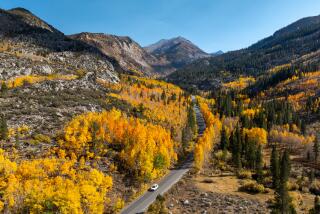New England Fears Losing ‘Leaf-Peepers’
- Share via
MONTPELIER, Vt. — The hills know nothing of Saddam Hussein; they hear no talk of recession. The vibrant reds, oranges and yellows emblazon the countryside before the long, white silence that lies ahead.
Only the people worry, especially those who make money from the annual pilgrimage of the millions of “leaf-peepers” who come north to view nature’s autumn splendor. New England’s sagging economy has many in the tourism business eager for a hearty foliage season.
“This is a critical season for the travel industry,” said Christopher Barbieri, president of the Vermont Chamber of Commerce. “After a soft summer in the region, we’re counting on this as a last blast before ski season.”
But, with such wild cards as the Persian Gulf crisis and increased competition from other states, the New England fall season may be weaker than in the past.
“This Middle East crisis could not have come at a worse time,” Barbieri said. “We’re watching to see how it affects the economic situation, which will in turn affect us. It’s a danger signal.”
A slow summer in the northern New England states--Vermont, New Hampshire and Maine--has them looking to the mid-September to mid-October fall foliage season to bolster the travel and retail industries.
“June and July were off by 5% and 15%,” said Dick Hamilton, president of New Hampshire’s White Mountain Attractions Assn. “If we can do well and go into a long, cold winter with a good fall season, people will be happy.”
In Maine, where tourism is the state’s second-largest industry, behind paper production, a weak season hurts the whole economy, John A. Johnson of the Maine Tourism Office said.
“Tourism is all we’ve got. In Massachusetts, people who aren’t hired as waiters or chambermaids can get jobs in light industry. We don’t have that here,” he said. “Oh, do we need a good year!”
The fall season has long been considered the gravy of the tourism year, because little or no promotion is needed to attract visitors.
But competition from other states that are heavily promoting the colors of their leaves--even Arkansas is seeking to attract the “leaf-peepers” with a sophisticated advertising campaign--is hurting the New England states, Barbieri said.
“We’ve always taken it for granted, but those days of assuming we have a corner on the leaf market are over,” he said. “Other places have discovered that they have pretty leaves too.”
New Hampshire, Maine and Vermont officials estimate that about a million people flock to their states in the brief but brilliant season.
But some of those people travel by car and may be inclined to stay at home this year because of rising gasoline prices.
“If there is a fuel shortage scare, then we will see a drop in business,” Barbieri said. “And, if gas prices rise above the psychological threshold of $2 a gallon, people may think twice.”
One indicator of a slow fall is hotel and bus tour reservations. Some motor coach operators say the market to New England is softer than it has been in the past.
“Reservations are not where they were four or five years ago,” said Peter Tauk, owner of Tauk Tours of Westport, Conn. “New England this fall is soft for every tour operator.”
The states are not forecasting a poor year, just a year that could leave some general store tills a little less full.
Barbieri said he expects the million tourists who will visit Vermont--twice the state’s population--to spend more than $16 million.
More to Read
Sign up for The Wild
We’ll help you find the best places to hike, bike and run, as well as the perfect silent spots for meditation and yoga.
You may occasionally receive promotional content from the Los Angeles Times.






